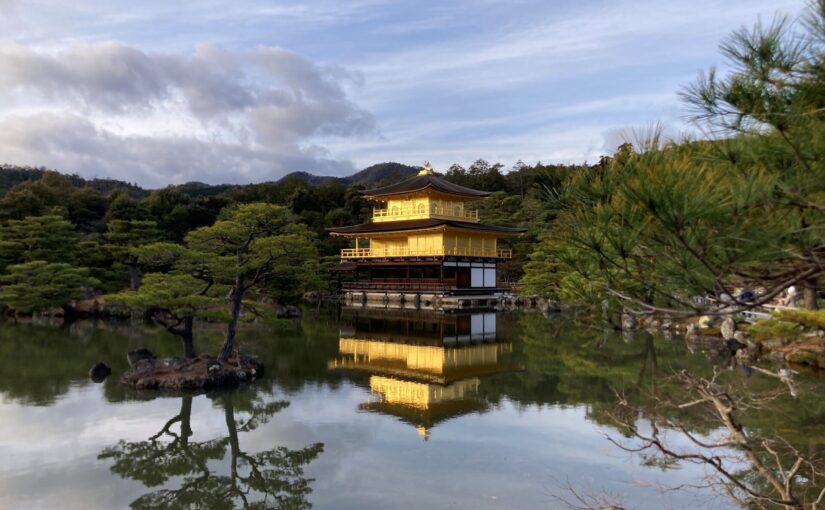Field of study in Wageningen: Landscape Architecture and Spatial Planning
Study period exchange: 01/10/2023 – 07/02/2024
Country (exchange): Japan
City (exchange): Kyoto
University (exchange): Kyoto University
Faculty (exchange): Faculty of Agriculture
2. Motivation for exchange
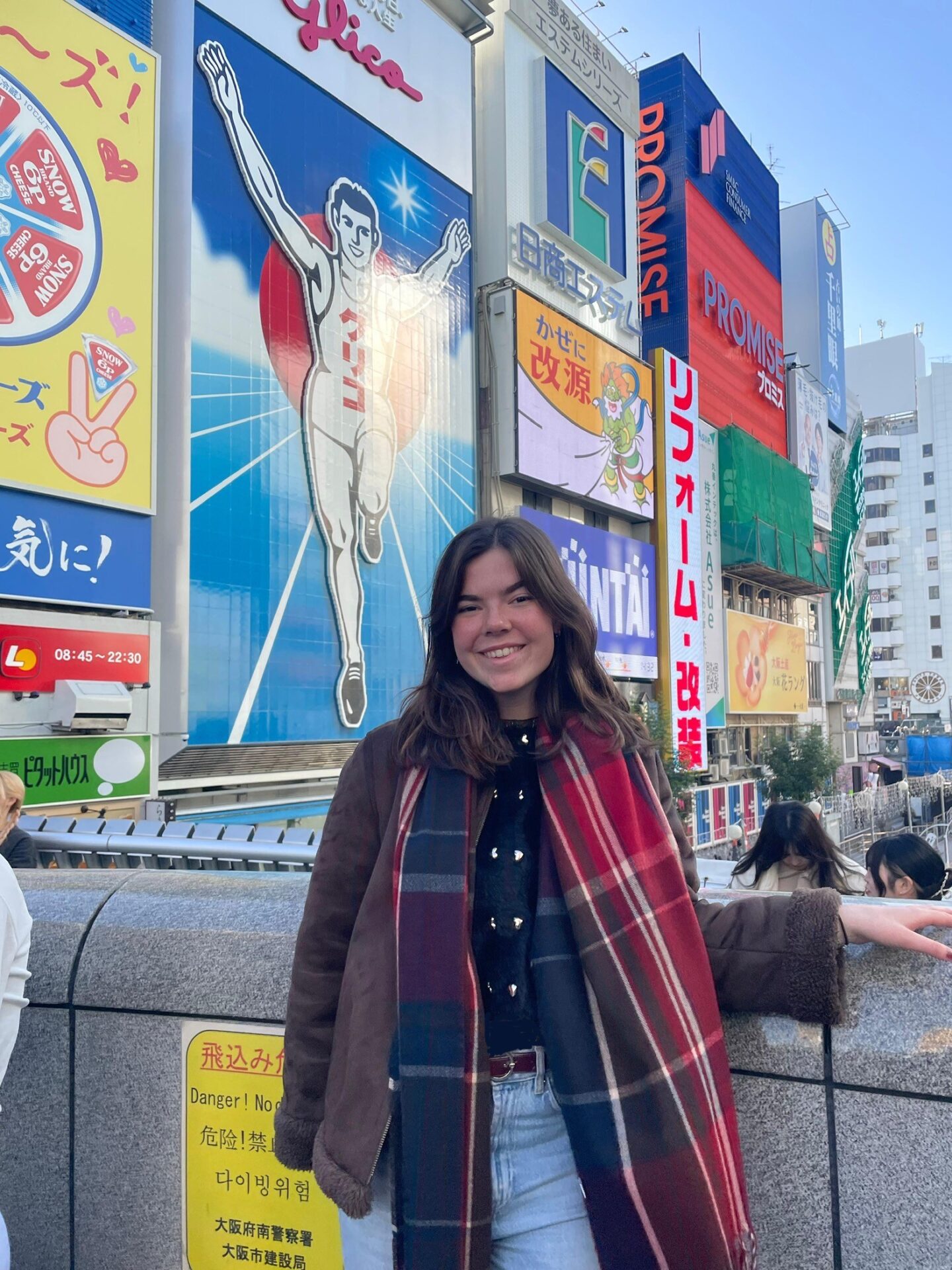
Why did you choose to go on study exchange?
It seemed like a very special and unique opportunity to experience what it would be like to live abroad for a longer period. This idea has appealed to me for a long time. I also thought it would be valuable to learn what it is like to go to university in a completely different country.
What is the reason you chose for this country/university?
I wanted to go to a country that is very different from the culture of the Netherlands. I also really wanted to live in a country that I was not yet familiar with. The culture of Japan really attracted me to learn more about it. A study abroad is a unique opportunity to really learn about a culture and a country.
What is the reason you chose for this university?
The destinations offered by WUR were Kyoto and Tokyo. The main choice between the two was because the Kyoto semester fit in better with the Wageningen schedule. Moreover, I was able to find enough courses in Kyoto University that interested me. Kyoto is a beautiful and lively city. So I was very happy with this choice.
3. Accessibility to reach destination
Do you have any advice about reaching your exchange destination?
Buy your flight ticket on time. By arrival at the airport, apply for a public transport card immediately. Within the city of Kyoto, owning a bicycle is a great option.
4. University and studying
Could you provide some general information about the followed courses?
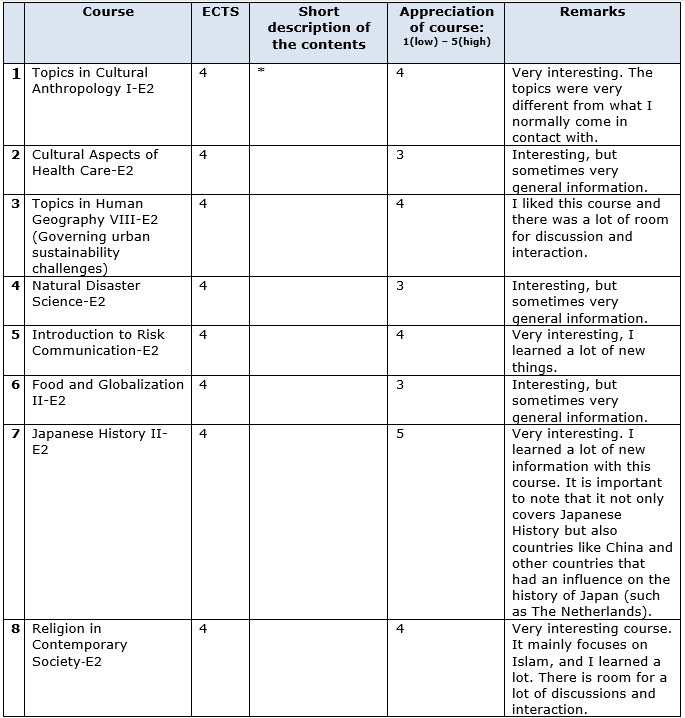
*Syllabus with all information about the different courses: https://www.z.k.kyoto-u.ac.jp/download/introduction/syllabus.pdf?1688563852
I had sufficient possibilities to select suitable courses that were taught in English:
Yes. In the list from Liberal Arts and Sciences there were lots of courses from all sorts which were taught in English.
I had sufficient possibilities to select suitable courses in my field of interest:
Yes. There were lots of courses. Be aware that for some courses there is a lottery system which decides who gets allowed in the course.
I am satisfied with the level of the courses that I followed:
Yes. The level of the courses were just right. Some courses required more work than others.
I am satisfied, in the end, with the selection of courses I followed:
Yes. I followed eight courses that really interested me.
What is it like to study there?E.g. study forms, academic level, examination, workload, lesson material?
Studying at Kyoto University really was an unique experience. The courses were really interesting. For lesson material, you’re laptop is sufficient. The workload is not too much, be aware that you will follow eight courses at the same time, this means that the examination also will be held during the same time. There was a mix in examination methods for the courses, the most had final exams, these were held in one exam week. Some courses had presentations and final reports, these also were mainly planned within the same weeks. I had also a lot of group work, which made it more possible to interact with classmates, including Japanese classmates.
What is the culture of the university?E.g. How approachable are the lecturers, engagement with local students? What are the differences with WU?
The lecturers were approachable and always able to answer questions. Engaging with Japanese students was quite a challenge, because of cultural differences and the language barrier, which was surprisingly big.
What does the university offer students additionally? E.g. Catering, sports facilities, laundry facilities?
A lot of students, including myself often ate at the cafeteria on campus. This was very affordable and offered a lot of great options, including vegetarian. There are sports facilities and clubs you can join.
5. Housing-travelling-living
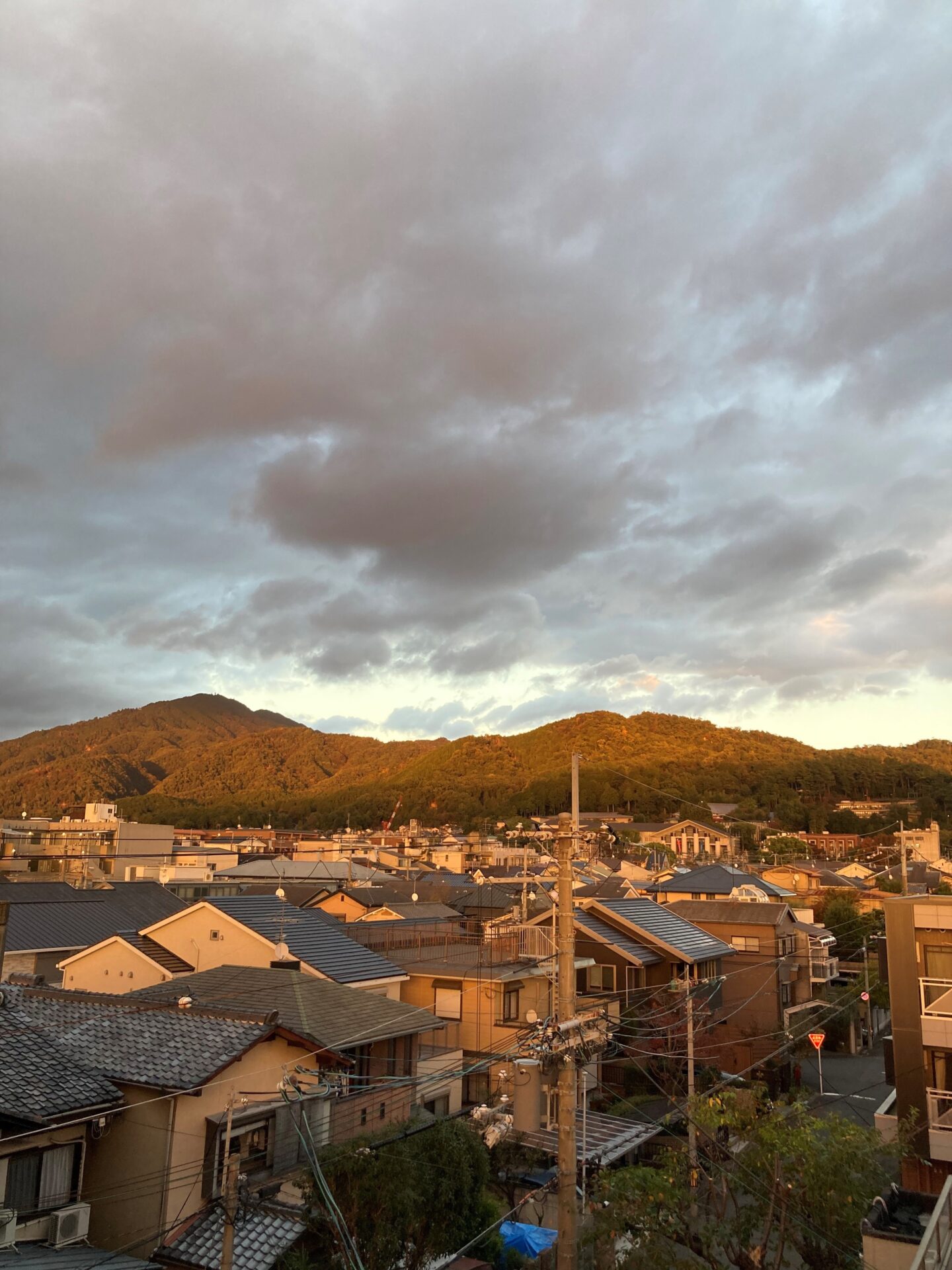 What are the possibilities for housing? E.g. Availability to sign up for a room on campus, private rooms, rent rates?
What are the possibilities for housing? E.g. Availability to sign up for a room on campus, private rooms, rent rates?
There are student dorms for which you can sign up. Most people will get a room through these. These rents are on average really low compared to Wageningen. You can submit a preference list and the dorms are decided through a lottery system. I did not get a dorm because of this. However I found a room in a shared house called 8NEST sharehouse. It is easier to get a room in Kyoto than it is in the Netherlands.
What is the culture like? E.g. Differences with home, local cuisine, habits, manners?
The culture is really different than the Netherlands. Japanese people are very polite and many social rules are found in daily life. I would recommend to learn about these before you leave to Japan. During your stay you will learn a lot more about the differences.
Could you give some information about public transport infrastructure? E.g. Cost public transport card, taxi prices, how to travel to the university?
I lived quite close to my university. I bought a bike and I only had to travel for 10 minutes by bike. I would definitely recommend getting a bike. To travel within Kyoto the bus would be the best option, this is very cheap. By arrival at the airport you can get a public transport card. The public transport network within cities and between cities is very good.
6. Expenses
Can you give an indication of your expenses for/during your exchange?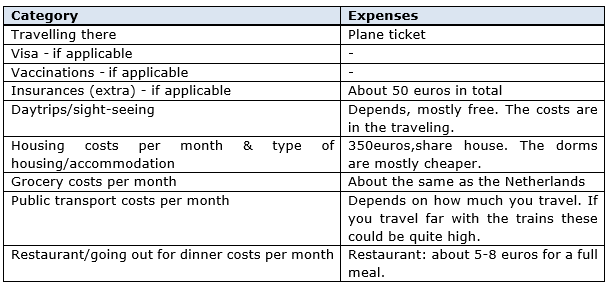
The price levels were in general in comparison to in the Netherlands:
The prices were in general lower or equalin in comparison with the Netherlands.
Additional remarks regarding expenses?
The living costs are about the same as the Netherlands. Some things, like dinner, going out, shopping, public transportation are cheaper than in the Netherlands. Because I travelled a lot during my stay, my expenses were a bit higher than I would spend in the Netherlands, due to expenses for transportation and hostels.
7. Free time
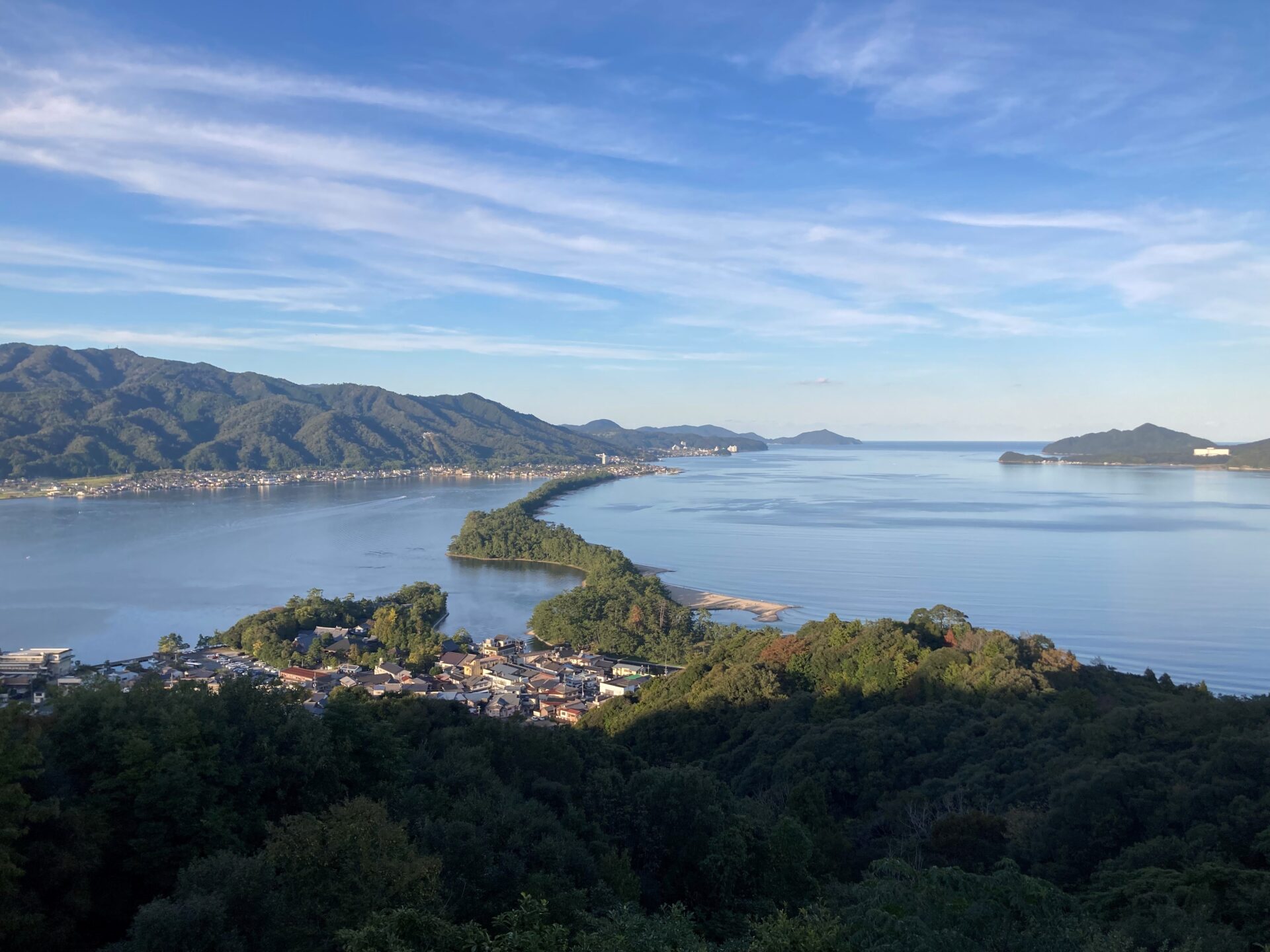
What are must-sees in the area? E.g. Nearby destinations, how do you prefer to travel, when to plan?
In Kyoto there is a lot to see. Only Kyoto already has 2000 temples! There is also a lot of nature. Also neighbouring cities and nature parks are definitely worth visiting.
What does not appear in a travel guide, but is definitely worth seeing/doing?
Visit smaller villages and nature areas. There are often not that many tourists and is still very authentic.
8. Challenges & best moment abroad
Any challenges? How did you deal with them?
There is a big language barrier, but the people are very willing to help you. Google translate will be a great help.
Best memory?
Meeting people from all over the world. Having a lot of opportunities to travel. Learn more about the beautiful culture of Japan.

9. Contact details
Would you like to ask Veerle more questions about her exchange?
Send her an e-mail: veerle.mortier@wur.nl

